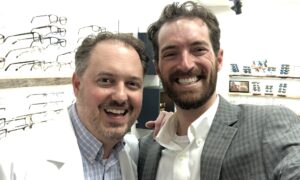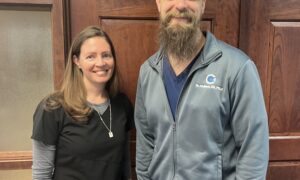Gerald A. Eisenstatt, OD, MBA
Do you understand and apply essential business concepts in managing your practice? Whether you are a new OD grad or veteran OD, here’s what to know and how to retool.
With graduation from optometry school such a long-awaited goal for students, it is no wonder most seem eager to get started right away. In this enthusiasm, it is important for new grads to consider their career goals and potential strategies for reaching those goals. To get new ODs started on what will hopefully be a profitable and fulfilling journey, here are my key pieces of advice. As director of the Hayes Center for Practice Excellence at the Southern College of Optometry, which prepares new graduates for the business side of optometry, I have seen hundreds of graduates off into the working world and most sadly do not understand the fundamental business concepts necessary to manage an optometric practice. In fact, many experienced ODs also lack those skills. Here is a primer that both new and experienced ODs can use to understand the concepts they need to lead their practice profitably.
Gerald A. Eisenstatt, OD, MBA
Southern College of Optometry
Class of 1984
Master of Business Administration,
Christian Brothers University
Class of 2011
Memphis Family Vision
Memphis, Tenn.
Locations: 2
Doctors: 3
Support staff: 20
Comprehensive exams: 6000+
Annual Revenues: $2,800,000
Understand Key Business Concepts
It is difficult for most optometry students to grasp the complexity of running the business side of a modern day optometry practice until they are actually in business. Optometry students should concentrate on basic business principles while they are in school such as:
1. How to read a profit and loss statement, balance sheet and cash flow statement.
2. Basic tax principles.
3. Understanding of payroll and human resources issues.
4. Credits and collections. I have found that many of today’s young people have never even balanced a check book. The more business knowledge an individual has, the more likely they will avoid falling into common personal and business pitfalls.
Measure, Measure, Measure
I am a big believer in measuring the productivity of your optometry practice. In my personal independent practice, every quarter my business manager supplies me with the 7 Hayes Center Key Metrics statistics of my office. These key metrics are costs of goods sold (COGS), occupancy expenses, advertising, general office expenses, equipment expenses, staff expenses, and most importantly, the NET income. This makes it much easier to isolate a problem area in the business that may need further investigation.
Decide: Own Your Own Practice or Start as Associate?
I would like all of my graduates to enter independent practice optometry immediately upon graduation, but I know that’s not likely. The decision whether to own your own business is dependent on the individual’s entrepreneurial spirit. Some graduates do not want to take on the extra effort to run a small business. Others find it attractive and motivating. That being said, there are still independent practice opportunities available that are employee types of positions. Many existing practitioners do not want to partner with another OD, but do hire optometrists to work in their practices. At the Hayes Center for Practice Excellence we discuss with the new graduates the pros and cons of being a small business owner, such as equity ownership and tax incentives afforded these business owners.
Become an Associate for a Practice You Believe In
I have run across a number of recent graduates who decided not to partner with another optometrist after working with them for the initial trial period. They felt the practice philosophy did not match their own business model. They decided to leave the business and seek out other practice opportunities. Make sure that the practice that you are considering working in matches the business and professional model that you desire.
Check Out Finances of Practice Before Joining
Some of the practices that hire new ODs do not have the patient volume to support the new young associate. The office should be grossing somewhere around $800,000-$1,000,000 and netting around 30 percent. This provides enough net income to pay the young associate a fair salary and enough discretionary income for the senior doctor to continue operations. The young OD needs to study the employment opportunity. Make sure there is a one- to two-week backlog of patients and the gross collected receipts are in the ideal range. It would be advantageous if the senior doctor would be willing to reduce their work load in the practice and allow the new graduate the opportunity to see some of the overflow patients.
Look for Patient Demand
I have found that most dissatisfaction in optometry comes from the lack of patient demand. After graduation you cannot just hang a sign on the door and expect patients to come flocking to see you. It takes planning and patience to achieve the practice of your dreams. I would suggest that all new graduates build a business plan. It should include an industry analysis, operations plan, marketing plan, strategic risk and analysis assessment and financial projections. This plan will help lay out the path by defining your goals. I suggest that business plan be developed while in optometry school or as soon as possible after graduation. Goals have to be set before they can be reached!
How Far Ahead Should New Grad Be Thinking?
Goals should be set and modified throughout one’s career. It’s never too early to plan for the future. Most young associates are not working in their original practice five years after graduation. Set your short-term goals first and then think about where you see yourself in five to 10 years. If you start off in a commercial practice, but you have always wanted to own your own business, start saving and planning for the transition into independent practice. Prepare yourself financially by saving enough money for a down payment. Don’t get in debt. The first few years of owning your own practice will be tough. One of the most difficult things about transitioning from commercial to independent practice is the temporary loss of income. But if the young OD will be patient, income generated by a business owner will certainly surpass an employee position.
Practice Medical Eyecare But Don’t Forget About Optical Dispensary
At first, the young OD will need to be willing to provide vision care for whatever type of patient needs their services. Many of the new graduates are very well trained in the medical side of optometry. This is wonderful. But let’s not forget about the importance of refraction and optical sales in the profitability of an optometry practice. Over 50 percent of the income generated in an independent practice is from the sale of ophthalmic goods. As a practitioner develops and tunes their skills, then a practice specialty can be developed.
Learn Art of Doctor-Patient Communication
It’s all about patient communications! Patients do not know if you graduated at the top of your class….but they can detect if you care about them. Young graduates need to develop personal communication skills and express a caring attitude. Today’s generation of students have grown up with e-mail, social media and texting. Many of today’s young people have never had to make that uncomfortable phone call to ask a person out on a date. Now they just use texting or Facebook. I would also recommend that the existing practitioner be patient with this new generation. They are good, caring young people who want to please their patient. They just need some guidance on how to accomplish this.
Patience for Difficult Patients
The customer is always right…at least let them think they are! I never let money stand in the way of patient satisfaction. If a patient wants their money back, I immediately give it to them with no questions asked. But most patients just want a solution to their problem and are willing to pay for this answer. Don’t think of difficult patients as being a problem; think of them as a challenge and a practice-builder if you can solve their issue.
Find an OD Mentor
Upon graduation, most students lack the business confidence needed to start or buy an independent practice. It is one of the most common comments I hear from my students and recent graduates. These business skills will develop over time. Mistakes will be made. Most established practitioners will tell you they still make business mistakes from time to time. I would like to suggest that the new graduates find a mentor, an independent practitioner who will take them under their wings and teach them the business side of optometry. Resources are available from sources like theHayes Center for Practice Excellence to help teach optometrists the business side of optometry. I also find that joining one of the optometry business excellence peer groups can be very beneficial for both young and experienced ODs.
Related ROB Articles
Getting There: Planning a Successful Optometric Career
Growth Opportunities for Independent ODs
Practice By the Numbers: Track Your Key Expenses
Gerald A. Eisenstatt, OD, MBA, is director, Hayes Center for Practice Excellence, at the Southern College of Optometry. Dr. Hayes also is the owner of his own independent practice, Memphis Family Vision in Memphis, Tenn. To contact him: geisenst@sco.edu



























